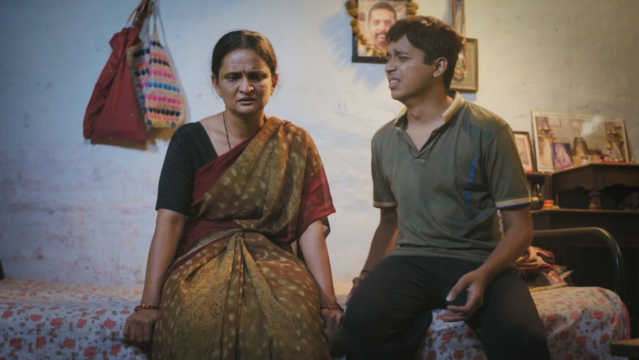
Sukhpreet Kahlon
New Delhi, 31 May 2022 17:56 IST
Sudarshan Gamare’s film raises awareness about a pertinent issue but is impeded by a protracted narrative and choppy performances.

‘Commoners shed blood that goes unnoticed like the blood of insects which exists but is not seen,’ is the epilogue to Sudarshan Gamare’s Hindi-language feature Haemolymph: Invisible Blood.
Based on the real-life incidents that unfolded with Abdul Wahid Shaikh, a simple school teacher who is accused of being involved in the 2006 Mumbai train bombings, the film examines the ways in which an innocent man fights for justice against an impassive system. Although Wahid was acquitted in 2015, his fight continued and he wrote the book Begunah Qaidi on his experiences. Originally written in Urdu, the book was translated into English as Innocent Prisoners.
Wahid (Riyaz Anwar) teaches in a school in Mumbai and goes about his ordinary life when one day, things go completely awry. He is picked up by the police and accused of sheltering the Pakistanis responsible for the 7/11 train bombings. Innocent, confused, with no idea why he has been apprehended, Wahid dutifully follows whatever the police ask him to do. Seen as being a SIMI (Students’ Islamic Movement of India) activist, he is beaten, and brutally tortured, and his family is subjected to intense mental harassment. The second half of the film traces his transformation from a victim to a man who decides to fight for justice, for himself as well as several others like him.
While foregrounding the travails of Wahid, Haemolymph focuses on the effects that such an incident has on the kin of the accused. We see the trauma that his brother faces, the ways in which his wife is harassed, and the constant anxiety that the family grapples with. The discrimination on the basis of religion is evident as Wahid responds to why he is being treated in a certain manner, saying, “Because I am a Muslim”.
The severe condemnation of police and the judicial system is tempered by glimpses of police functionaries who are mere cogs in the system, unable to really exercise their will.
Although the film steers clear of sensationalizing the events that took place, it overextends them in part. The film also tries to do too much in its attempt to be faithful to the incidents that unfolded and maintain a balanced view. However, this comes at the cost of what could have been a much tighter and more forceful narrative. The background music is choppy and discordant with the action in certain places, especially in the beginning.
Riyaz Anwar’s performance is adept at portraying the hapless school teacher but wants gravitas to carry the film on his shoulders, especially in the second half when he decides to stand up to the forces. The supporting cast is largely temperate in its performances, bringing in an air of predictability to the narrative.
Nonetheless, Haemolymph has its heart in the right place as it raises pertinent questions about the innocent people rotting in jails without hope. One hopes that films like these raise awareness about the judicial system and encourage action for the better.
You might also like

Review Marathi
Samaira review: This well-intentioned travel drama suffers from a dull script
Actor Rishi Deshpande's directorial debut doesn't rise as much as its performances. ...

Review Marathi
Goshta Arjunchi review: Triggering conversations about mental health
Anupam Barve’s short film urges people to talk to their families about what they are going...

Review Marathi
Ekda Kaay Zala review: Sumeet Raghvan impresses in a film that does not use its full potential
Directed by Dr Saleel Kulkarni, the film has a fine act by child artiste Arjun Purnapatre....

